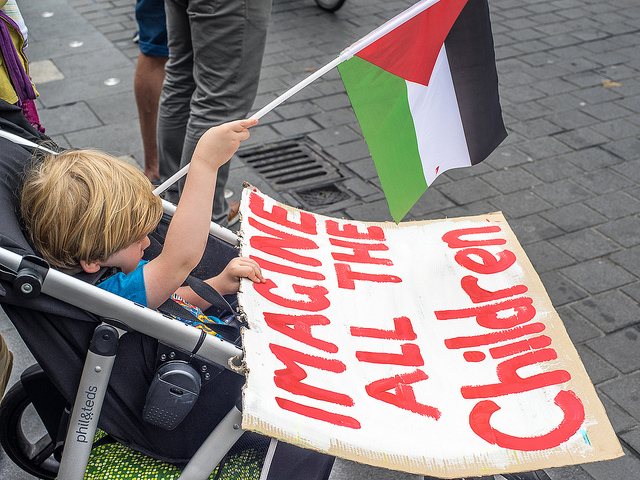Just imagine…
Imagine that you are a 10 year-old child born in Gaza. By now you would have witnessed 11 of what Israel calls “Operations” having such fanciful names as Rainbow, Autumn Cloud, Summer Rain, Warm Winter, Returning Echo, Cast Lead, Pillar of Defense and Protective Edge, the last three actually being devastating all-out wars.
In our haste to politicize the Israeli-Palestinian conflict, one often overlooks those most vulnerable. One forgets the horrendous price that Gaza’s children are paying, robbed of a future, maimed and deeply traumatized, or killed. A study conducted by the Gaza Community Mental Health Program (CMHP) after Operation Cast Lead found that 75 percent of the children over the age of six were suffering from one or more symptoms of post-traumatic stress disorder.
While CMHP works with thousands of children to help them deal with the violence around them, the Gaza health infrastructure is ill equipped to handle the thousands of injured requiring highly specialized treatments. As Yara Hawari writes in the UK Independent: “These are serious, life altering injuries, including amputations, the loss of eyes, and brain damage.”
Dr. Izzeldin Abuelaish was in Gaza in 2009 during Operation Cast Lead. He knows that Gaza cannot treat adequately all of its injured children, especially given the shortage of clean water and electricity, and the bombing of 25 health care facilities.
He has therefore officially requested that 100 children be allowed into Canada for treatment in Ontario hospitals, and Health Minister Dr. Eric Hoskins has responded that Ontario is on board, adding that the province has a “moral responsibility” to help injured children, whether Israeli or Palestinian. Both Toronto’s Sick Kids Hospital and Kingston General Hospital say they’ll participate.
During an interview, Dr. Abuelaish told Global News: “This idea came to my mind as someone who was burned by the fire of conflict and war.” He proposes that the World Health Organization identify which children could withstand the journey and best benefit from medical attention in Canada.
While Ontario is ready to help, and Abuelaish insists that his project is purely humanitarian and “resolutely non-political”, the Harper government has shown no interest in the proposal or in facilitating the visas needed to travel to Canada.
Canada’s Foreign Affairs office has responded with the usual Israeli talking points that have become their leitmotif: “Hamas’s reckless aggression continues to put Palestinian lives at risk by impeding the delivery of humanitarian assistance to Gaza”.
As an afterthought, lip service was paid to the Palestinian people in that Canada is apparently “considering a variety of options on how to best assist the current humanitarian situation.” However, no option has been put forward to date and some Canadian media have concluded that Ottawa is refusing to allow injured Gaza children into Canada for treatment.
In the meantime, the British government, which has been working with Medical Aid for Palestinians (MAP), has flown specialist consultants into Gaza. These will carry out initial assessments to determine local needs, with the aim of deploying post-reconstructive surgery specialists to Gaza and the West Bank. Professor Sir Bruce Keogh, Medical Director for the National Health Service (NHS) specified: “However we have made arrangements for the most severely injured children to be brought to the UK to be treated at one of the 16 trauma centres in England. “
While the UK government is actively helping Gazans, Harper dilly-dallies. One can imagine a number of possible reasons for his inaction, beyond an inability to rise above prejudice and/or partisanship:
- fear of appearing “soft” on Hamas, since some Israeli and religious leaders see no difference between Hamas and the children of Gaza;
- fear that bringing injured Palestinian children to Canada will humanize them, putting names and faces to these innocent victims; or
- fear that by telling their stories to Canadians, a big hole will appear in the Israeli narrative that Harper has adopted as his own?
Referring to a different war, Harper stated: “We remain disturbed by ongoing reports of intimidation and incarceration of political leaders and journalists, harassment of minorities, reported disappearances and allegations of extra judicial killings.”
Well said, Prime Minister. Yes, this is the right stance and we need to keep up the pressure so they can be free at last. Now, how about expressing the same concern for Palestinians?
The Prime Minister may not see the parallel between Tamils and Palestinians, but others do:
“Like the Palestinians, the Tamils know what it is like to be bombed and shelled while huddling in a church or hospitals with nowhere to run. They know what it is like to watch their children being sliced in half by shrapnel, and seeing whole families vaporized by chemical bombs. They know what it is like to see their homes destroyed and they know what it feels like when the entire world turns away from taking real action to prevent it.”
Dr. Abuelaish’s project requires that our “Canadian values” demonstrate respect for the dignity and worth of every human being, including Palestinians. Meanwhile, Harper’s conservatives continue to embrace the expedient in-your-face tactics of the American Tea Party, viewing anything relating to the Israeli/Palestinian conflict strictly through a political lens, while ignoring the humanitarian prism proudly used by most Canadians.
Is there any hope that our Prime Minister will pause in his sideline cheer leading for Israel long enough to act constructively on behalf of Gaza’s wounded children?
Bahija Réghaï is a human rights activist and former president of the National Council on Canada-Arab Relations (NCCAR).



